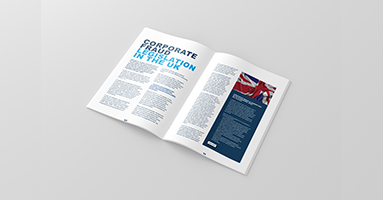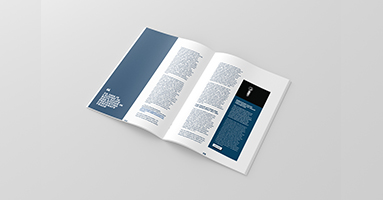The causal factors of financial crimes
Financial crimes have been a cross-border phenomenon for centuries. As borders between countries have gradually eroded, the opportunity for certain crimes to be committed on a transnational scale has not escaped notice. In the past decade, we have witnessed “creative” new forms of transnational financial crimes such as:
- electronic crime (cyber-crime);
- money laundering;
- terrorist financing;
- market abuse and insider dealing; and
- information security.
The cost of transnational organised crime is estimated to be roughly 3.6 per cent of the global economy. According to U.N. reports, money laundering alone costs at least 2 per cent of global gross domestic product every year.
As the global impact of transnational financial crime increases to unprecedented levels, attention has turned to the need to fully understand the motivations that lead to the perpetration of such crimes. CRI® Group has recently published an ebook that provides insightful looks into today’s issues at the forefront of fraud and corruption. They range from deep dives into the U.S., U.K. and other anti-fraud and anti-corruption laws worldwide to close examinations of actual fraud cases that hold lessons for all of us. This ebook provides an in-depth study of transnational financial crimes and the national laws and regulations. Laws in the U.S. and the U.K., in particular, are compared and examined in terms of effectiveness in preventing financial crimes. The comparative study focuses on corporate fraud. “The Catalysts for Economic Crime” pursues the question of how weaknesses in national laws can be considered “a core causal factor in the perpetration of transnational financial crimes.” We invite you to download this ebook and increase your knowledge of fraud, corruption, proper compliance, risk assessments, due diligence, etc.
An Investigative Study into Causal Factors of the Perpetration of Transnational Financial and Economic Crime(s)
This study will critically consider the catalysts for an economic crime to identify the motivations contributing to transnational financial crimes’ perpetration. The study will commence with a brief overview of different forms of transnational crimes – namely, money laundering, bribery and fraud. The focus will then be placed on fraud, particularly corporate fraud – a particularly problematic and controversial form of financial crime. Followed by a comparison between U.K. law and U.S. law on corporate fraud will then be undertaken.
Readers will learn about the need to strengthen such laws or risk continued and increased criminal activity. Different types of financial crimes are examined, including money laundering, due to its prominence as a form of transnational financial crime. The research provides a detailed discussion of the inadequacies in current national laws. It proposes solutions through increased accountability, compliance-focused on self-governance and heightened monitoring for violations, among other important considerations. This comparative study will focus on corporate fraud to support the ultimate conclusion set forth; that weaknesses in national laws are a core causal factor in the perpetration of transnational financial crimes. This reveals the need to strengthen such laws to deter and prevent such criminal activity. U.S. and U.K. law will be critically compared to determine how they can be deemed effective in preventing financial crimes.
Fraud and corruption are always evolving. Changes in factors such as technology make it vital that any professional trying to prevent and detect it also evolve. Part of that process is to analyse fraud, corruption, bribery, money laundering and other crimes through research, casework and knowledge exchange. When experts share their findings and knowledge of how they address fraud, everyone benefits – especially vulnerable small businesses and people.
Download your FREE “The Catalysts for Economic Crime” ebook here!

An Investigative Study Into Causal Factors of the Perpetration of Transnational Financial Crimes Mock Up 1

An Investigative Study Into Causal Factors of the Perpetration of Transnational Financial Crimes Mock Up 2
Who is CRI® Group?
Based in London, CRI® Group works with companies across the Americas, Europe, Africa, Middle East and Asia-Pacific as a one-stop international Risk Management, Employee Background Screening, Business Intelligence, TPRM, Due Diligence, Compliance Solutions and other professional Investigative Research solutions provider. We have the largest proprietary network of background-screening analysts and investigators across the Middle East and Asia. Our global presence ensures that no matter how international your operations are we have the network needed to provide you with all you need, wherever you happen to be. CRI® Group also holds BS 102000:2013 and BS 7858:2012 Certifications, is an HRO certified provider and partner with Oracle.
In 2016, CRI® Group launched Anti-Bribery Anti-Corruption (ABAC®) Center of Excellence – an independent certification body that provides education and certification services for individuals and organisations on a wide range of disciplines and ISO standards, including ISO 31000:2018 Risk Management- Guidelines; ISO 37000:2021 Governance of Organisations; ISO 37002:2021 Whistleblowing Management System; ISO 37301:2021 (formerly ISO 19600) Compliance Management system (CMS); Anti-Money Laundering (AML); and ISO 37001:2016 Anti-Bribery Management Systems ABMS. ABAC® offers a complete suite of solutions designed to help organisations mitigate the internal and external risks associated with operating in multi-jurisdiction and multi-cultural environments while assisting in developing frameworks for strategic compliance programs. Contact ABAC® for more on ISO Certification and training.



